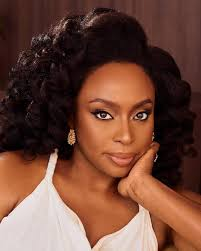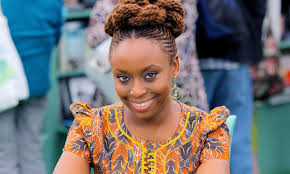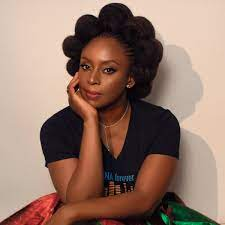She is a writer and a feminist. Her novels not only tell great stories but change your perspective of life. She writes about a vast spectrum, from adolescence, feminism and racism to the culture of Nigeria and Black Americans. She has also delivered two landmark TED talks, one in 2009, The Danger of A Single Story, and the other in 2012, We Should All Be Feminists. These talks sparked a wide ranging conversation about feminism and were published as a book in 2014, Dear Ijeawele
15 September 1977
Enugu, Nigeria
Black African
- In 2003 she published her first novel Purple Hibiscus, which won the Commonwealth Writers’ Prize in 2005
- In 2006 her second novel Half of a Yellow Sun was published and won the Orange Prize for Women’s Fiction
- In 2013, her novel Americanah won the US National Book Critics Circle Award and was named one of The New York Times’ Top Ten Best Books of 2013
Chimamanda grew up on the campus of the University of Nigeria, Nsukka. Her father James Nwoye Adichie was a Professor, and her mother Grace Ifeoma was the first female Registrar in the university. Chimamanda began a degree in Medicine at Nsukka, but changed her major after leaving for the USA at the age of 19 to continue her studies. She graduated summa cum laude from Eastern Connecticut State University with a degree in Communication and Political Science.
- 2005 – 2006 academic year she was awarded a Hodder fellowship at Princeton University
- 2011 – 2012 academic year she was awarded a fellowship at the Radcliffe Institute of Harvard University
- In 2008 she received a MacArthur Fellowship.
- She has received honorary doctorate degrees from several colleges/universities including Eastern Connecticut State University, Johns Hopkins University, Haverford College, Williams College, the University of Edinburgh, Duke University and Amherst College
- In 2015 she was named one of Time Magazine’s 100 Most Influential People in the World
- In 2017 she was named one of the World’s 50 Greatest Leaders by Fortune Magazine.
- She is a member of both the American Academy of Arts and Letters and the American Academy of Arts and Sciences
- She received Hurston/Wright Foundation’s North Star Award, 2021
- In 2003 she published her first novel Purple Hibiscus which won the Commonwealth Writers’ Prize (2005)
- In 2006 her second novel Half of a Yellow Sun was published and won the Orange Prize for Women’s Fiction
- In 2013 her novel Americanah won the US National Book Critics Circle Award and was named one of The New York Times’ Top Ten Best Books of 2013
- Chimamanda’s work has been translated into over thirty languages
- 2013 Chicago Tribune Heartland Prize (fiction category) for Americanah
- Winner of the Best of the Best of the second decade of the Baileys Women’s Prize for Fiction (formerly the Orange Prize for Fiction) 2015, for Half of a Yellow Sun
- She was awarded a UN Foundation Global Leadership Award, in 2019
- Chimamanda was born and grew up in Enugu Nigeria. At the age of 19, she went to the USA to complete her education, where she showed great promise since recognised by various institutions
- In 2009, she married Ivara Esege, a Nigerian doctor
- In an interview in July 2016, she said that she had recently given birth to a daughter
- She divides her time between the USA and Nigeria, where she leads an annual creative writing workshop
“Igbo is a major influence since most of my characters speak it and since I mutter in Igbo when the writing is not going well. Language and style are very important to me.”
“I am influenced by everything I read, I suppose. I read bad fiction and it influences me in such a way that I know what never to do. I read good fiction and it makes things flow for me, as it were.”
“Nigeria is the one place where I question myself the least. I lived in the US for about seven years – it is a place that is very convenient and I am happy there, but I don’t belong.”
“I love the people. I love the average Nigerian. I love the sense of can-do in the face of all sorts of horrors. I love the languages. I love the way people walk and the way people dress traditionally… I feel a real sense of connection with the country. I can go back to my ancestral village and walk the same dusty path that my great-grandfather probably walked on and that gives me a sense of being rooted.”
- http://www.cerep.ulg.ac.be/adichie/cnaprim.html
- The Chimamanda Ngozi Adichie website. (n.d.). Retrieved March 5, 2022, from http://www.cerep.ulg.ac.be/adichie/cnaprim.html
- Home. Chimamanda Ngozi Adichie. (2021, November 29). Retrieved March 5, 2022, from https://www.chimamanda.com/
Guardian News and Media. (2005, March 6). Tales from my travels: Chimamanda Ngodi Adichie. The Guardian. Retrieved March 5, 2022, from https://www.theguardian.com/travel/2005/mar/06/observerescapesection3





